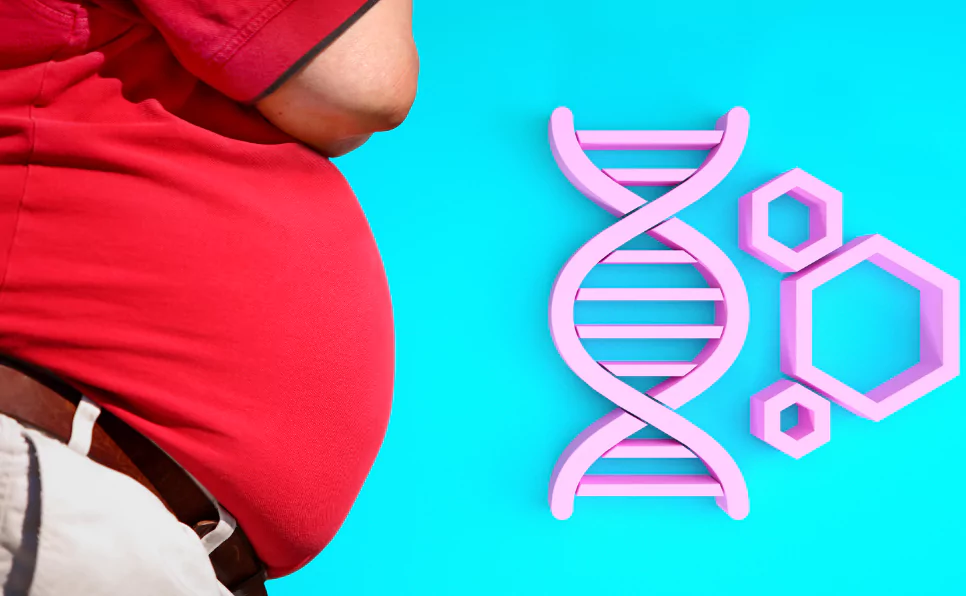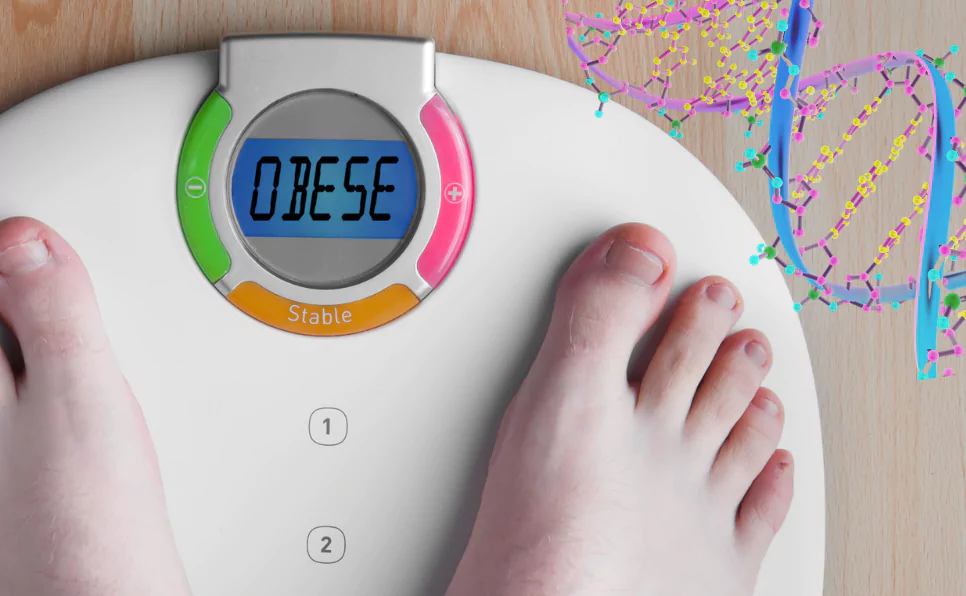Ever wonder, “why do I crave for sugar” when you’re feeling low or bored? You’re not alone. Sugar cravings are a common thing, and they can be hard to overcome.
Sugar activates the brain’s reward system, releasing dopamine and other neurotransmitters that produce feelings of pleasure.
Sugar also stimulates the release of endorphins, natural mood enhancers. This creates a positive loop that reinforces sugar consumption.
However, excessive sugar intake can lead to weight gain, insulin resistance, and other metabolic disturbances that increase the risk of obesity and type 2 diabetes. Research suggests that there may be a genetic component to sugar cravings and their relation to obesity and diabetes.
This article explores the possible connection between why we crave sweets and our genetic makeup and how it can affect your health and eating habits.
Quick Note:
Want a quick overview: Sugar cravings, common during low or bored moments, are linked to the brain’s reward system activation, releasing dopamine and endorphins.
These cravings can be influenced by genetics, potentially leading to health issues like obesity and type 2 diabetes.
Research suggests a genetic predisposition to sugar cravings, with taste perception also playing a role.
For a deeper dive into how genetics affect our desire for sweets and the health implications, keep on reading this article.
The Role of Genetics & Taste Perception in Sugar Cravings
Genetics play a role in determining physical traits like height, hair color, blood type, and eye color. They also influence some behaviors like personality, intelligence, and preferences.
Recent research indicates that some of us may be genetically predisposed to crave sugar more than others.
However, genetics is not the only factor shaping traits and behaviors. Environmental factors, such as nutrition, education, culture, and experience, also have an impact.
Taste perception and preference are examples of how genetics and environment interact. The ability to sense different flavors and preference for certain tastes are influenced by both genetics and environment.
Taste perception is a complex process involving several steps:
- First, our tongue’s taste buds detect molecules from food or beverages that dissolve in saliva.
- These taste buds contain specialized cells called taste receptors that bind to these molecules and trigger electrical signals.
- Then, these signals travel along nerve fibers to the brainstem and then to various parts of the brain that process taste information.
- Finally, the brain integrates this taste information with other sensory inputs (like smell, sight, touch) and cognitive factors (like memory, emotion) to give us a perception of flavor.
Taste perception influences our food preferences by creating positive or negative associations with certain flavors.
For example, if you enjoy the sweet taste of chocolate cake, you may develop a preference for it over other desserts.
However, not everyone perceives sweetness the same way. Differences in sweetness perception and preference may be influenced by certain genetic variants affecting the function of the T1R2 and T1R3 receptors, which bind to sugar molecules.
These genetic variants may explain why some people crave sweets more than others, leading to health problems.
Indeed, sugar cravings are linked to several health conditions like obesity and diabetes.
Studies Linking Genetics to Sugar Cravings
Some interesting research studies tried to figure out why some people may experience an intense desire for sweets more than others.
While these studies suggest a connection, they don’t prove that specific genes cause sugar cravings.
Case Study 1: The Danish Health Examination Survey
First, we’ve got a study based on data from the Danish Health Examination Survey, which involved more than 6,500 participants. These people shared details about their eating habits and took some blood tests and genetic analysis.
Researchers looked at variants of a specific gene called FGF21 to see if there was a link with how much sweet food and drink these folks consumed.
They found that people with a certain version of the FGF21 gene reported liking sweet foods and drinks more than others.
They also drank more sugary beverages and had higher levels of certain fats and lower levels of good cholesterol in their blood. Both these factors can increase the risk of heart disease.
This makes the researchers think that this FGF21 gene variant might lead to more sugar intake and less energy being used.
However, there are some limitations to this study. For one, it was based on what people said they ate, which isn’t always 100% accurate.
It also didn’t consider other things that might influence sugar cravings, like stress, mood, or social cues.
Moreover, this study didn’t prove that the FGF21 gene variant causes sugar cravings. It just showed a possible connection. So, we need more studies to confirm this and understand why this happens.
Case Study 2: The UK Biobank
Another interesting study used data from the UK Biobank, which involved more than 500,000 participants. The researchers looked at variants of a gene called Prkar2a to see if it was linked with a preference for high-sugar, high-fat foods.
They found that people with a certain version of the Prkar2a gene reported liking high-sugar, high-fat foods more than others.
These folks also had higher body mass index (BMI), larger waist size, and higher blood pressure. All of these are signs of obesity and high blood pressure.
The researchers think that this Prkar2a gene variant might change how the brain handles stress and anxiety, leading to more stress-induced eating.
But this study also has limitations. So again, we need more studies to confirm this and understand why this happens.
Case Study 3: The TwinsUK Registry
A third study used data from the TwinsUK Registry, which involved more than 2,000 female twins. The researchers looked at variants of a gene called SLC6A4 to see if it was linked with how much sweet food these women ate.
They found that those with a certain version of the SLC6A4 gene reported eating more sweet foods. They also reported more episodes of binge eating, higher emotional eating scores, and higher BMI.
The researchers think that this SLC6A4 gene variant might reduce the availability of a brain chemical called serotonin, leading to more emotional eating and reduced control over eating impulses.
Counter Arguments and Limitations
While these studies do suggest there might be a genetic reason behind why we crave sugar, they are not without flaws and opposing viewpoints.
One argument is that sugar cravings aren’t just about genetics. Factors like how available and affordable sweet foods are, advertising and social norms can also play a big role.
Some people argue that these environmental factors might have a bigger impact on sugar cravings than our genes, especially in a world where tempting, high-calorie, low-nutrient foods and drinks are everywhere.
They worry that focusing too much on genetics might distract us from these important environmental factors that we can change to reduce sugar intake and its negative health effects.
Another argument is that sugar cravings aren’t always bad. They could signal that our body needs more energy or certain nutrients.
Eating sugar could also help improve our mood, help us perform better, and even serve as a way to cope with stress, anxiety, or depression.
Plus, sugar can play a positive role in social bonding and celebrations. So, putting all the blame on sugar might overlook its positive sides and its role in human evolution and culture.
A third argument is that sugar cravings can vary widely based on individual differences.
Factors like age, sex, hormonal status, physical activity level, sleep quality, mood state, personality traits, dietary patterns, and health status can all influence how much someone craves sugar.
Therefore, trying to apply the same idea of sugar cravings to everyone might miss out on the diversity and complexity of human responses to sugar.
On top of these counterarguments, the studies themselves have some limitations that might affect how accurate and applicable their findings are.
These include using self-reported measures of sugar intake, relying on observational designs, small sample sizes, not accounting for other genetic variations or confounding factors, and lack of replication or validation studies.
These issues suggest we need more robust and comprehensive studies to better understand the connection between genetics and sugar cravings and its implications for health.
Implications and Potential Applications
Despite these limitations, the studies on genetics and sugar cravings could have implications for various fields.
This includes personalized nutrition, where the understanding of genetic variation in taste perception could help design individual dietary interventions.
This knowledge could also help treat eating disorders and guide public health initiatives to reduce sugar consumption and its health consequences.
Other Factors That Affect Sugar Cravings
While genetics play a role, it is not the only player in the game. There are numerous other factors, including diet, stress, and even sleep patterns, that can make us crave sweets.
Diet and Sweet Cravings
One of the most prominent factors influencing sugar cravings is your diet. Consuming high amounts of sugary foods and beverages can lead to a cycle of sugar “highs” and “lows,” triggering further cravings.
When you consume sugar, your blood glucose level spikes, leading to a surge of energy. However, this is typically followed by a sharp drop in blood sugar levels, known as a “sugar crash,” that can leave you feeling lethargic and craving more sugar for an energy boost.
This cycle can be tough to break but is key to curbing your sweet cravings.
Stress and Sugar Cravings
Stress is another significant factor that can increase your sugar cravings. When you’re stressed, your body produces more of the hormone cortisol, which can stimulate your appetite and specifically increase your craving for sugary foods.
Sweets often provide temporary comfort or distraction from stress, but in the long run, they can exacerbate stress levels and lead to a vicious cycle of stress and sugar consumption.
Sleep and Sugar Cravings
Sleep deprivation can also influence your sugar cravings. Lack of adequate sleep disrupts your body’s hunger hormones, ghrelin and leptin, leading to increased appetite and specifically a greater craving for energy-dense, high-sugar foods.
Getting a good night’s sleep is, therefore, an essential strategy for controlling your sweet cravings.
Controlling Your Sweet Cravings
Knowing these factors, there are several strategies you can use to manage your sugar cravings:
- Balanced Diet: Make sure your diet is balanced with plenty of protein, fiber, and healthy fats, all of which can help keep your blood sugar levels stable and prevent sugar crashes that trigger cravings.
- Stress Management: Techniques such as mindfulness, yoga, or regular physical activity can help manage stress levels and, in turn, curb sugar cravings.
- Adequate Sleep: Ensure you’re getting enough sleep each night to regulate your body’s hunger hormones and prevent sleep-related sugar cravings.
- Hydration: Sometimes, dehydration can be mistaken for sugar cravings. Make sure you’re drinking enough water throughout the day.
- Mindful Eating: Paying attention to what and when you eat can help you identify patterns in your sugar cravings and find healthier ways to satisfy them.
Wrapping Up
We hope this article has given you a clear picture of what we currently know about why our genes might make us crave sugar and how this might affect our eating habits and health.
While genetics may influence our propensity for sweet cravings, they’re not the whole story.
By understanding the role of diet, stress, sleep, and other factors in sugar cravings, we can take active steps to manage these cravings and make healthier dietary choices.
Controlling your sweet cravings isn’t about completely eliminating sugar from your diet, but rather about finding a healthier and more balanced approach to consuming sweets.
References:
- https://www.sciencedirect.com/science/article/abs/pii/S0149763407000589
- https://onlinelibrary.wiley.com/doi/abs/10.1002/ffj.2059
- https://journals.physiology.org/doi/full/10.1152/ajpregu.00338.2013
- https://nyaspubs.onlinelibrary.wiley.com/doi/full/10.1111/j.1749-6632.2012.06558.x
- https://www.sciencedirect.com/science/article/pii/S0960982207023700
- https://onlinelibrary.wiley.com/doi/full/10.1002/oby.21790
- https://onlinelibrary.wiley.com/doi/full/10.1111/j.1467-789X.2012.01001.x
- https://academic.oup.com/ajcn/article/97/3/584/4571510
- https://www.sciencedirect.com/science/article/pii/S1550413117302140

Dr. Sumeet is a seasoned geneticist turned wellness educator and successful financial blogger. GenesWellness.com, leverages his rich academic background and passion for sharing knowledge online to demystify the role of genetics in wellness. His work is globally published and he is quoted on top health platforms like Medical News Today, Healthline, MDLinx, Verywell Mind, NCOA, and more. Using his unique mix of genetics expertise and digital fluency, Dr. Sumeet inspires readers toward healthier, more informed lifestyles.





